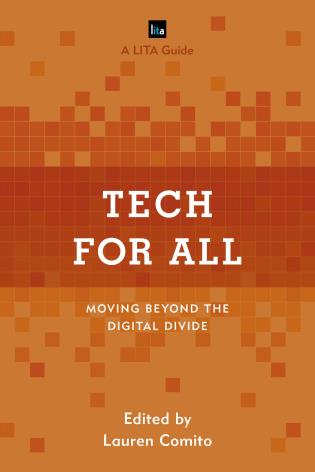Tech for All – Moving beyond the Digital Divide
Edited by Lauren Comito
Rowman & Littlefield
Published in 2019
Order Here!

How can libraries ensure that patrons from all socio-economic and ethnic backgrounds have access to advanced technology training and hardware? Everyone knows libraries provide access to computers and the internet for day to day use, but many libraries have gone beyond those basic services. Makerspaces and advanced tech training are often not equitably distributed between differing communities. The digital divide is still very real, and by not providing equal access to maker spaces and other similar services libraries may be unintentionally contributing to that divide.
This book examines how the unequal distribution of resources between communities can limit access to emerging technologies. Chapters from librarians across the country give real world examples of libraries going the extra mile to bring more than just email access to their communities, regardless of economic status or geographic distribution.
You’ll find practical plans put forward by working professionals who have sought pragmatic solutions to issues of digital literacy. Access is a through line in this work as people look at the larger ideas of access as inclusive of training, diverse technologies, and the time and space to make genuine growth in tech literacy.
Chapters include:
- working with immigrants,
- low cost laptops for library use,
- deep dives into the underpinnings of the maker movement, and
- developing community-focused technology training.
After reading this book, librarians should have practical ideas to address the issue of equity in access to emerging technologies in their own communities.
Reviews
Even if your shelves are already stuffed with professional development titles, you should find space for this one. It’s not another shopping list for your first makerspace or the same summary of computer basics you’ve already seen. Instead, Tech for All provides innovative ideas on topics like IT-centered training for library staff and methods to measure patron interest in potential tech offerings. It also includes sound advice on grant-seeking to fund it all. Clearly written and exceptionally practical, the book also separates itself from the pack by addressing a variety of communities and demographics. The ideas here can be applied at libraries of all kinds, not just those in major metropolitan systems, and it doesn’t neglect populations that are often overlooked when we talk about the digital divide. As solid a book on this topic as you’re likely to find.
Craig Lefteroff, Booklist – Starred Review
So many good ideas here! Comito and her team have created a great go-to guide of tech-forward ways to help libraries happily greet and engage with the 21st century. This is an exceptional collection of peer-tested tools and tips for libraries big and small wanting to work on digital inclusion.
Jessamyn West, librarian, Vermont Mutual Aid Society & Librarian.net
Tech for All takes a fresh look at one of the most important issues facing both libraries and society: how do we seek equity of access and training to technology when economic equity escapes us? Both important and approachable, this book is a must-read for librarians, staff, board members, and anyone with a connection to how their local libraries could better serve those most in need.
Jason Griffey, affiliate, MetaLab at Harvard University
Tech for All is a practical, shining example of a great how-to book. It concentrates on showing the reader multiple projects from start to finish with the results of each specific project, including how each of these projects engaged library customers and staff with the target technology. This book is not a “this is how you could do it” it is the more effective “This is how WE did it, and you can too.” The success of the projects covered in the book can be the pebble that ripples in your community. Kudos to all of the project contributors and the editor.
Maurice Coleman, host, producer, and creator, T is for Training; principal, Coleman and Associates